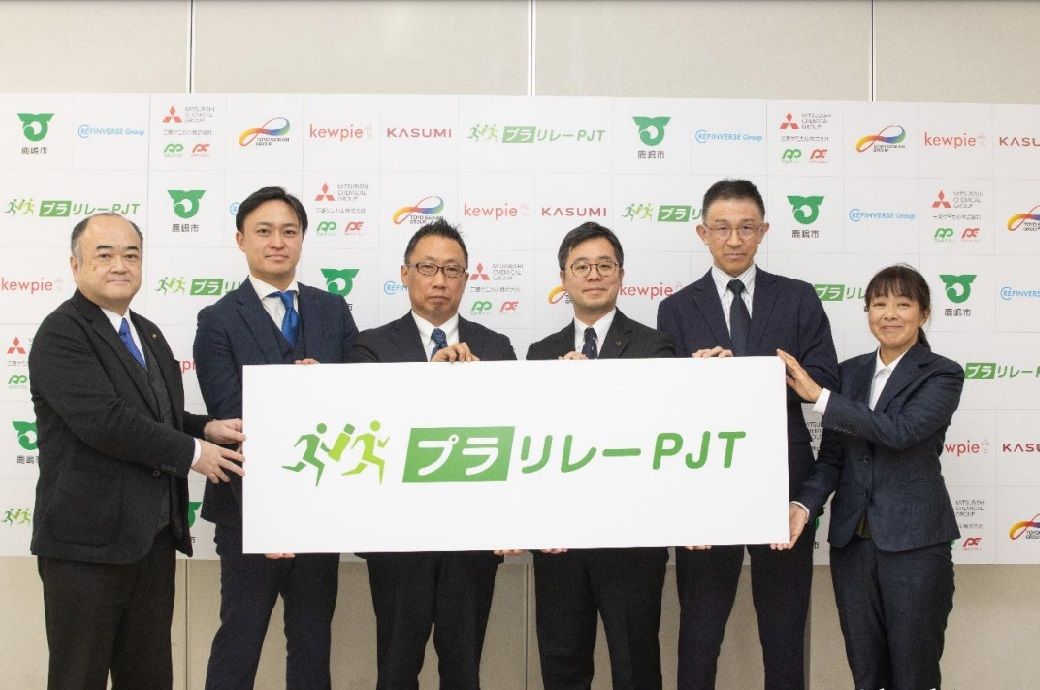
Kashima City of Ibaraki Prefecture (Mayor: Shinichi Taguchi; “Kashima City”), REFINVERSE, Inc. (President & CEO: Akira Ochi; Head Office: Chiyoda-ku, Tokyo; “REFINVERSE”), Mitsubishi Chemical Corporation (Representative Directors: Yasuo Shimodaira and Nobuo Fukuda; Head Office: Chiyoda- ku, Tokyo; “Mitsubishi Chemical”), Toyo Seikan Group Holdings, Ltd. (President and Representative Director: Ichio Otsuka; Head Office: Shinagawa-ku, Tokyo; “Toyo Seikan Group”), Kewpie Corporation (Representative Director President and Chief Executive Corporate Officer: Mitsuru Takamiya; Head Office: Shibuya-ku, Tokyo; “Kewpie”), and KASUMI CO., LTD. (President and Representative Director: Hideaki Tsukada; Head Office, Tsukuba City, Ibaraki; “KASUMI”) have entered into a six-party comprehensive partnership agreement with an objective to promote closed-loop recycling of plastic packaging in Ibaraki Prefecture on February 14, 2025. In this pilot project, each of the six partners will pass materials onto the next partner to promote the recycling of plastic through the supply chain.
Dubbed the “Pla-relay Project,” it is the first closed-loop recycling of packaging project in Japan that leverages the unique strengths of a local government, a waste collecting company, a chemical manufacturer, a packaging manufacturer, a food manufacturer and a supermarket.
Objective and background of the partnership agreement
As the recycling of plastic packaging and containers is essential to achieve a sustainable society, local governments, manufacturers, and retailers are promoting a variety of recycling projects.
However, unlike containers that are easy to sort and send to mechanical recycling, such as cans, PET bottles, glass bottles, and cardboard, plastic containers are difficult to sort, collect, and recycle by material type since a single container can be composed of different materials, even though they may appear similar.
To address this issue, the companies that specialize in the manufacturing, sales, collection and recycling of plastics agreed to collaborate and promote the circulation of plastic packaging using chemical recycling (also known as advanced recycling) in Kashima City.
Outline of the project
In this project, the parties will develop a circular model to chemical recycle caps and inner plugs of salad dressing bottles, items that are used in daily life. Caps and inner plugs of salad dressing bottles will be collected experimentally at public elementary schools in Kashima City and REFINVERSE will collect and perform the pretreatment of the used caps. Mitsubishi Chemical will then convert the
pretreated caps into raw material for chemicals at its new chemical recycling plant, which will in turn be transformed into plastic resins at Japan Polypropylene and Japan Polyethylene. Mebius Packaging, a subsidiary of Toyo Seikan Group, will mold the plastic resin into caps and plugs for
bottles, which Kewpie will use in their salad dressing bottles. Finally, KASUMI will sell the finished products at its Kashima Stadium Store, returning the plastics into the hands of the residents of Kashima City. The finished products, which use the mass balance approach, will be available for sale around the summer of 2025.
During periods before and after the pilot, opportunities to research and study plastic resources, tours of participating companies’ plants, and recycling education programs will be offered to public elementary schools and junior high schools in Kashima City.
Furthermore, the six parties plan to jointly create and publish a “validation report on the closed-loop recycling of plastic packaging” by March 2026, based on issues specified and feedback obtained through the project.
Future actions
The purpose of this pilot project, which will be carried out in 2025, is to validate and establish a framework for achieving a closed loop recycling process for post-consumer plastic waste within a specific area. The six parties will verify various matters and issues—such as the required quality and quantity of waste plastics, issues related to recycling, the various certifications and procedures that are required, and how to communicate the appeal of products made from recycled materials to consumers—and clarify the costs involved and methods of covering such costs. Then, based on the verification, the six parties will then endeavor to set guidelines by working with industries and local communities.
ALCHEMPro News Desk (HU)
Receive daily prices and market insights straight to your inbox. Subscribe to AlchemPro Weekly!